As a business owner or property manager, understanding how weather conditions affect your commercial roof is essential for its longevity and performance. In this blog, we’ll explore the impact of weather elements and provide practical tips to protect your investment.
Rain and Water Damage
PROBLEM: Rainwater can create ponding on your commercial roof and can seep through cracks, damaged seams, or compromised flashing, leading to leaks and water damage inside your building.
SOLUTIONS:
- Regular Inspections: Schedule routine roof inspections to identify weak spots and address them promptly.
- Proper Drainage: Ensure gutters and downspouts are clear of debris. Proper drainage prevents water accumulation.
- Quality Materials: Invest in weather-resistant roofing materials that can withstand heavy rain.
Wind and Uplift Forces
PROBLEM: Strong winds can create uplift forces, lifting roofing materials and causing damage.
SOLUTIONS:
- Secure Rooftop Items: Loose equipment, signs, or HVAC units can become projectiles during storms. Properly secure them.
- Choose Wind-Resistant Materials: Choose roofing materials designed to withstand high winds.
Extreme Temperatures
PROBLEM: Rapid temperature fluctuations can cause roofing materials to expand and contract, leading to cracks and leaks.
SOLUTIONS:
- Quality Installation: Hire experienced contractors who understand material expansion and contraction.
- Regular Maintenance: Inspect seams, flashing, and joints to detect any issues early.
Hail and Impact Damage
PROBLEM: Hailstorms can dent or puncture roofing materials, compromising their integrity.
SOLUTIONS:
- Impact-Resistant Materials: Consider impact-resistant shingles or metal roofing.
- Regular Inspections: Inspect for any hail damage after severe weather events.
Snow and Ice Accumulation
PROBLEM: Snow and ice buildup can add significant weight to your roof, leading to structural strain.
SOLUTIONS:
- Snow Removal: Safely remove snow to prevent excessive weight. Hire professionals for ease and safety.
- Insulation and Ventilation: Proper insulation and ventilation help regulate temperature, preventing ice dams.
By understanding the weather’s impact on your commercial roof and taking proactive measures, you can extend its lifespan and avoid costly repairs. Regular inspections, quality materials, and professional maintenance are key to keeping your roof in top condition. Remember, a well-maintained roof not only protects your property but also ensures the safety and comfort of everyone inside.
Contact ASI to learn how we can protect your investment from weather damage.

